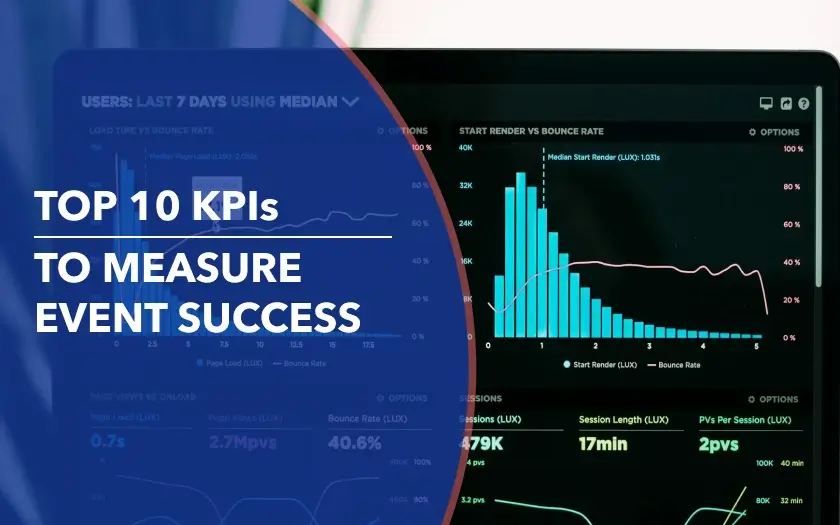Top 10 Important KPIs to Measure Success of Your Virtual Event


Picture this – you’ve just finished your first virtual event. You had a stellar lineup, guests were delighted and to top it all off, your event hashtag is trending on Twitter. What’s next? Well, the most crucial aspect of any event, live or virtual, is whether the goal you set out was achieved or not. You might ask, how can you measure whether the goal was met or not? The answer is everyone in the events industry’s best friend – key performance indicators. KPIs, which simply measure the success of an event.Virtual event KPI’s differ from live events. That is good news for all you virtual event planners! Virtual event KPI’s are in fact easier to track, measure and analyse. It’s clear that virtual event KPIs are the key to measure how successful your event is. Firstly, brush up how to overcome the challenges that arise with virtual events. Now all that’s left to pinpoint is which KPIs are the ones that you need. Don’t worry, we’ve done the hard work and identified the top 10 KPIS that will determine if your virtual event was an outstanding hit or a total flop.
1. Number of Attendees
The number of guests deems whether your virtual event was a hit. Don’t forget that certain niche industries will have lower attendee numbers but that doesn’t mean that your event was a catastrophe. Keep your industry in mind when measuring this virtual event KPI.
2. Attendee Duration
Attendee duration is the average time guests spent at each booth, event or speaker during the virtual conference. This metric allows virtual event managers to identify which speaker or event was the most successful.
3. Attendee Engagement
Networking is one of the main goals for every successful event, whether it’s live or online. Successful virtual events should include chat channels, break rooms and networking breaks.Measuring chat channel traffic is a good indicator of attendee engagement. Make sure your virtual events platform includes a robust chat channel and amusing break rooms.
4. Sponsorship Engagement
One metric that is often overlooked is measuring sponsorship engagement. Indicators such as views or actions taken are crucial if you want to gain future sponsorship opportunities.
5. Heat Maps
Heat map metrics is another superb KPI that places virtual events ahead of live conferences. Heat maps use different colours to show where guests are congregating the most on the virtual expo floor.
6. Number of Sales Leads Generated
The goal of any event is to raise awareness and consequently generate sales. Measuring the increase in sales which are directly related to your virtual event is an essential KPI.
7. Feedback Score
The post-event survey is one of the simplest yet insightful methods of measuring your event’s success. Using a score rating of 1 to 10, Include valuable questions such as:
- How helpful was the technical support during the event?
- How user-friendly was the virtual events software?
- How likely are you to attend another event organised by us
Additionally, include an empty comment box so guests can leave specific feedback.
8. Social media engagement
Analyse social media platforms to see if there has been an increase in follows, comments and shares after the event unfolds. Increase in social media engagement is a great indicator in seeing if your event increased brand awareness. Now that your social media presence is boosted, make the most of it and engage with your new following.
9. Web Traffic
A great event has lasting success. Website visits and actions that were taken are excellent measures of your event’s success. Check out your pre-event and post-event web traffic to see if your event left guests curious about your product.
10. Gross Revenue
Money is always the end goal of any event. Revenue should not be the sole indicator of event success. However, it is an important virtual event KPI. Measure projected revenue against actual revenue to see if there are any differences. More importantly, use data to analyse why those disparities occurred. A well-executed virtual event can have a powerful effect on ROI and brand awareness, but it must first make a lasting impact on the guests.
Find out how Remo can help your virtual event make a lasting impression through a personalized demo or an online product tour.



























